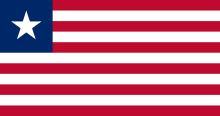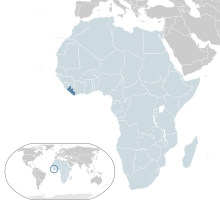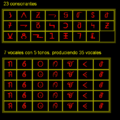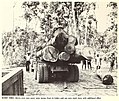Portal:Liberia
The Liberia Portal  Liberia (/laɪˈbɪəriə/ ), officially the Republic of Liberia, is a country on the West African coast. It is bordered by Sierra Leone to its northwest, Guinea to its north, Ivory Coast to its east, and the Atlantic Ocean to its south and southwest. It has a population of around 5.5 million and covers an area of 43,000 square miles (111,369 km2). The official language is English. Over 20 indigenous languages are spoken, reflecting the country's ethnic and cultural diversity. The capital and largest city is Monrovia. Liberia began in the early 19th century as a project of the American Colonization Society (ACS), which believed that black people would face better chances for freedom and prosperity in Africa than in the United States. Between 1822 and the outbreak of the American Civil War in 1861, more than 15,000 freed and free-born African Americans, along with 3,198 Afro-Caribbeans, relocated to Liberia. Gradually developing an Americo-Liberian identity, the settlers carried their culture and tradition with them while colonizing the indigenous population. Led by the Americo-Liberians, Liberia declared independence on July 26, 1847, which the U.S. did not recognize until February 5, 1862. Liberia was the first African republic to proclaim its independence and is Africa's first and oldest modern republic. Along with Ethiopia, it was one of the two African countries to maintain its sovereignty and independence during the European colonial "Scramble for Africa". During World War II, Liberia supported the U.S. war effort against Nazi Germany and in turn received considerable American investment in infrastructure, which aided the country's wealth and development. President William Tubman encouraged economic and political changes that heightened the country's prosperity and international profile; Liberia was a founding member of the League of Nations, United Nations, and the Organisation of African Unity. The Americo-Liberian settlers did not relate well to the indigenous peoples they encountered. Colonial settlements were raided by the Kru and Grebo from their inland chiefdoms. Americo-Liberians formed into a small elite that held disproportionate political power, while indigenous Africans were excluded from birthright citizenship in their own land until 1904. In 1980, political tensions from the rule of William R. Tolbert resulted in a military coup, marking the end of Americo-Liberian rule and the seizure of power of Liberia's first indigenous leader, Samuel Doe. Establishing a dictatorial regime, Doe was assassinated in 1990 in the context of the First Liberian Civil War which ran from 1989 until 1997 with the election of rebel leader Charles Taylor as president. In 1998, the Second Liberian Civil War erupted against his own dictatorship, and Taylor was overthrown by the end of the war in 2003. The two wars resulted in the deaths of 250,000 people (about 8% of the population) and the displacement of many more, with Liberia's economy shrinking by 90%. A peace agreement in 2003 led to democratic elections in 2005. The country has remained relatively stable since then. (Full article...) Selected article - The United Nations Mission in Liberia (UNMIL) was a United Nations peacekeeping operation established in September 2003 to monitor a ceasefire agreement in Liberia following the resignation of President Charles Taylor and the conclusion of the Second Liberian Civil War (1999–2003). At its peak it consisted of up to 15,000 UN military personnel and 1,115 police officers, along with civilian political advisors and aid workers. UNMIL superseded the United Nations Observer Mission in Liberia (UNOMIL), which had been established in 1993 to support the peacekeeping efforts of the Economic Community of West African States (ECOWAS) during the First Liberian Civil War (1989–1996). Two years of relative peace ended with another civil war, triggered by conflict between rebel groups and Taylor's administration. Large scale fighting ended following the Accra Peace Agreement in August 2003, and UNMIL was subsequently formed to implement the terms of the agreement and help establish a new transitional government. Through a unanimous resolution of the UN Security Council (UNSC), UNMIL was initially given a one-year mandate that included providing security, protecting UN personnel and facilities, supporting humanitarian assistance, promoting security reform, and implementing the peace process, which included elections in 2005. The mission would be regularly extended for another fifteen years, during which it successfully facilitated two free and fair elections, maintained security, and helped rebuild infrastructure and political institutions, often in close cooperation with local civil society groups. (Full article...) Did you know -
More Did you know (auto generated)
Selected image -TopicsCities and townsRelated portalsWikiProjectsAssociated WikimediaThe following Wikimedia Foundation sister projects provide more on this subject:
SourcesDiscover Wikipedia using portals |

































































